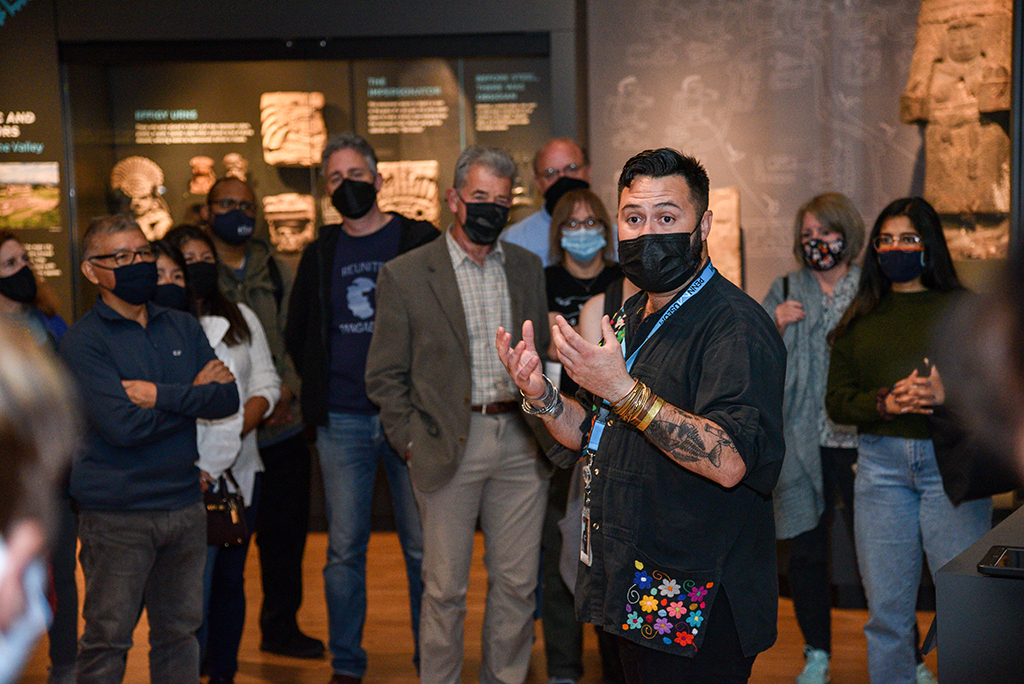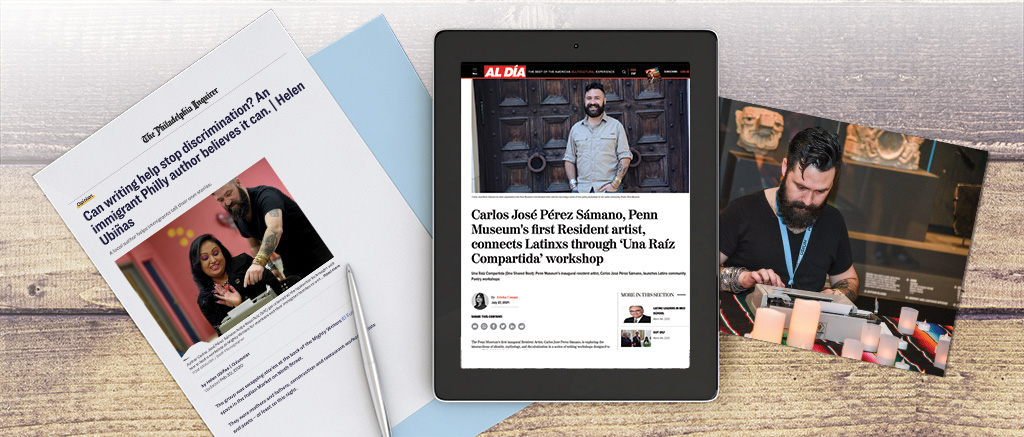
When I was invited to become the artist in residence for the Penn Museum I was shocked. It was the first time I received such an invitation and of course a great honor. Also, I knew that I shouldn’t use this opportunity to showcase my work as an individual writer, even if that sounded attractive for my personal career, but to make a statement about the relevance of community participation. We live in a world, not to say this country, that values more the individual effort than the collective one, so I wanted to follow my values and reclaim spaces for us, the people.
The main objective of the artistic residency One Shared Root—the first artistic residency in the history of the Penn Museum—was to facilitate access to poetic training; to the reflection about the aesthetic and political function, and the disruptive capacity of language; to the collective creation processes and to the claim of a narrative of its own from and for the Spanish-speaking immigrant community.
The Museum, in its genuine desire to decolonize itself and to transform our understanding of the human experience, decided to open itself to such a risky task: letting the community reclaim its own narratives (and its poetics), to listen—perhaps for the first time—to the voice of those who have been systematically silenced.
Working as a Global Guide for a couple of years gave me the freedom to tell the story through my own perspective. The Global Guides Program really believes in the decolonization processes and allows us, people from different countries and backgrounds, to embrace our values, our ways of understanding ourselves and, to share them with the public. It has been such an affirming experience to be able to recognize my own value as a person in historical context and to see how that can enrich other people’s life by sharing it. And it is from the Global Guides Program that I could think of the relevance of doing a poetry workshop for the Latinx community.
I’ve always believed in the power of poetry to change realities. It is through language that we understand the world. We think because we have the words to create an idea. We tell toddlers how to name things so they can start thinking. And when we do poetry we are doing what a five-year-old does: change the ways of naming things. So a bath tub can be the entire ocean, and one little ant can also be our best friend. Poetry allows us to think differently, and we need to think of new ways to craft our future together. That’s why we need to teach poetry to everyone, especially to those who are constantly excluded.
The project began with a series of free, public, street, and non-academic poetry workshops aimed at members of Philadelphia’s migrant Latino community, some of whom are workers in the restaurant, cleaning, and construction industries, as well as housewives, students, farmers, and workers. As a result of these workshops, which were held mainly in urban public places such as parks, parking lots, or gardens, the participants reflected on their identity using archaeological objects present in the Museum as a starting point.
The next stage of the process consisted of a second series of workshops in collaboration with different institutions such as Mighty Writers, the Mexican Cultural Center of Philadelphia, the Center for Culture, Art, Work and Education (CCATE), Philatinos, Philibros, Acción Colombia, the Department of Spanish and Portuguese of Temple University, The Free Library of Philadelphia, among others, through which the participants were accompanied in their poetic creation processes.
All these efforts were materialized in a bilingual book called Una Raíz Compartida/One Shared Root. The poems that you can find in that publication are the fruit not only of these workshops, and of these months of artistic work, but of all the years of suffering, work, joy, dreams, blood, sweat, and tears of our Latin American migrant community condensed in few powerful words.
I have to confess that all the poems submitted are of the best poetical value. They are full not only with the deepest human experience, but with the freshness that only the truth can provide. One of the lines that froze my blood is written by a woman who didn’t go to school and worked for years as a janitor:
I lived the nightmare.
A mother without a family.
My time and my spirit disappeared.
I was cutting myself in pieces.
I couldn’t make time and think if $7.50 was really good to make.
They sucked my youth and life.

Carlos José Pérez Sámano is a writer from Mexico, as well as Global Guide and artist-in-residence at the Penn Museum. His work explores identity, migration, and decolonization, and spans the genres of fiction, poetry, and memoir. Find more at: www.perezsamano.com
